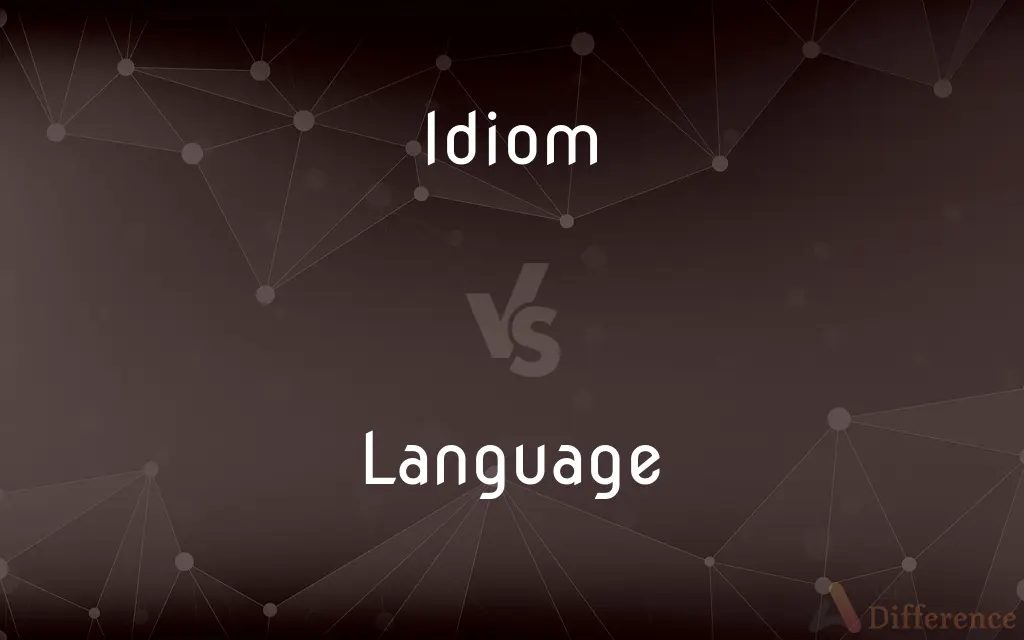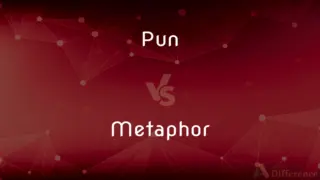Idiom vs. Language — What's the Difference?
By Maham Liaqat & Fiza Rafique — Updated on April 5, 2024
An idiom is a phrase with a meaning not deducible from its individual words, e.g., "kick the bucket," whereas language is a structured system of communication used by a community, e.g., English or Spanish.

Difference Between Idiom and Language
Table of Contents
ADVERTISEMENT
Key Differences
An idiom is a fixed expression with a figurative meaning, such as "break the ice," which means to initiate social interactions, while language encompasses a broad range of vocabulary, grammar, and syntax used for communication. Idioms are specific to a particular language and culture, reflecting unique idiomatic expressions that may not have direct translations in other languages, whereas language itself is a universal concept, with every community having its own language or dialects for everyday communication.
Idioms often encapsulate cultural wisdom, beliefs, or humor, making phrases like "spill the beans" culturally specific to revealing a secret, on the other hand, language is a tool for expressing not just information, but also emotions, laws, and scientific concepts, transcending cultural nuances to include universal principles of communication. The understanding and use of idioms require familiarity with the language and cultural context, highlighting how idioms can be challenging for language learners, whereas language acquisition involves learning to communicate using the basic to complex structures of speech and writing within any given language.
In terms of linguistic studies, idioms are studied as part of pragmatics or the study of language use in context, whereas the study of languages encompasses phonology, morphology, syntax, and semantics. This difference underscores how idioms are seen as elements within a language that add depth and color, while languages are analyzed and structured from a broader, more systematic perspective.
From a pedagogical viewpoint, teaching idioms involves explaining their meanings, origins, and appropriate contexts for use, which can be quite nuanced and culturally loaded, whereas teaching a language focuses on grammar, vocabulary, pronunciation, and writing skills, which are more standardized and universally applicable across different contexts.
Idioms contribute to the richness and expressiveness of a language, offering insights into the cultural and historical contexts of its speakers, while language itself is the foundation for all forms of verbal and written communication, encompassing a wide range of expressions, including idioms.
ADVERTISEMENT
Comparison Chart
Definition
A set phrase with a figurative meaning.
A system of communication with rules and structures.
Function
To express ideas in a culturally specific way.
To facilitate communication in general.
Components
Fixed expressions.
Vocabulary, grammar, syntax, phonology.
Variability
Specific to a culture or language.
Universal, with variations among communities.
Learning Difficulty
Can be challenging due to cultural nuances.
Broad learning curve from basics to proficiency.
Compare with Definitions
Idiom
"Bite the bullet" means to endure a painful experience.
I just had to bite the bullet and get my vaccination.
Language
English is a widely spoken global language.
She speaks English fluently.
Idiom
"Piece of cake" means something very easy.
The exam was a piece of cake.
Language
Mandarin Chinese has the most native speakers worldwide.
He is learning Mandarin Chinese for business.
Idiom
"Hit the nail on the head" describes doing something exactly right.
You hit the nail on the head with that answer.
Language
German language marks three genders: masculine, feminine, and neuter.
In German, Mädchen (girl) is neuter.
Idiom
"Burning the midnight oil" indicates working late into the night.
She was burning the midnight oil to finish the project on time.
Language
Spanish is known for its phonetic spelling.
Spanish words are spelled exactly how they sound.
Idiom
"Break the ice" means to initiate social interactions.
He told a joke to break the ice at the meeting.
Language
French is often referred to as the language of love.
They exchanged vows in French.
Idiom
An idiom is a phrase or expression that typically presents a figurative, non-literal meaning attached to the phrase; but some phrases become figurative idioms while retaining the literal meaning of the phrase. Categorized as formulaic language, an idiom's figurative meaning is different from the literal meaning.
Language
A language is a structured system of communication used by humans, based on speech and gesture (spoken language), sign, or often writing. The structure of language is its grammar and the free components are its vocabulary.
Idiom
A group of words established by usage as having a meaning not deducible from those of the individual words (e.g. over the moon, see the light).
Language
Communication of thoughts and feelings through a system of arbitrary signals, such as voice sounds, gestures, or written symbols.
Idiom
A characteristic mode of expression in music or art
They were both working in a neo-impressionist idiom
Language
Such a system including its rules for combining its components, such as words.
Idiom
A speech form or an expression of a given language that is peculiar to itself grammatically or cannot be understood from the individual meanings of its elements, as in keep tabs on.
Language
Such a system as used by a nation, people, or other distinct community; often contrasted with dialect.
Idiom
The specific grammatical, syntactic, and structural character of a given language.
Language
A system of signs, symbols, gestures, or rules used in communicating
The language of algebra.
Idiom
Regional speech or dialect.
Language
(Computers) A system of symbols and rules used for communication with or between computers.
Idiom
A specialized vocabulary used by a group of people; jargon
Legal idiom.
Language
Body language; kinesics.
Idiom
A style of artistic expression characteristic of a particular individual, school, period, or medium
The idiom of the French impressionists.
The punk rock idiom.
Language
The special vocabulary and usages of a scientific, professional, or other group
"his total mastery of screen language—camera placement, editing—and his handling of actors" (Jack Kroll).
Idiom
A manner of speaking, a mode of expression peculiar to a language, language family, or group of people.
In English, idiom requires the indefinite article in a phrase such as "she's an engineer", whereas in Spanish, idiom forbids it.
Some of the usage prescriptions improved clarity and were kept; others that yielded discordant violations of idiom were eventually revised.
Language
A characteristic style of speech or writing
Shakespearean language.
Idiom
(programming) A programming construct or phraseology that is characteristic of the language.
Language
A particular manner of expression
Profane language.
Persuasive language.
Idiom
A language or language variety; specifically, a restricted dialect used in a given historical period, context etc.
In the idiom of the day, they were sutlers, although today they'd probably be called vendors.
Language
The manner or means of communication between living creatures other than humans
The language of dolphins.
Idiom
An established phrasal expression whose meaning may not be deducible from the literal meanings of its component words.
She often spoke in idioms, pining for salad days and complaining about pots calling the kettle black.
Language
Verbal communication as a subject of study.
Idiom
An artistic style (for example, in art, architecture, or music); an instance of such a style.
The idiom of the expressionists
Language
The wording of a legal document or statute as distinct from the spirit.
Idiom
The syntactical or structural form peculiar to any language; the genius or cast of a language.
Idiom may be employed loosely and figuratively as a synonym of language or dialect, but in its proper sense it signifies the totality of the general rules of construction which characterize the syntax of a particular language and distinguish it from other tongues.
By idiom is meant the use of words which is peculiar to a particular language.
He followed their language [the Latin], but did not comply with the idiom of ours.
Language
(countable) A body of words, and set of methods of combining them (called a grammar), understood by a community and used as a form of communication.
The English language and the German language are related.
Deaf and mute people communicate using languages like ASL.
Idiom
An expression conforming or appropriate to the peculiar structural form of a language.
Some that with care true eloquence shall teach,And to just idioms fix our doubtful speech.
Language
(uncountable) The ability to communicate using words.
The gift of language
Idiom
A combination of words having a meaning peculiar to itself and not predictable as a combination of the meanings of the individual words, but sanctioned by usage; as, an idiomatic expression; less commonly, a single word used in a peculiar sense.
It is not by means of rules that such idioms as the following are made current: "I can make nothing of it." "He treats his subject home." Dryden. "It is that within us that makes for righteousness." M. Arnold.
Sometimes we identify the words with the object - though by courtesy of idiom rather than in strict propriety of language.
Language
(uncountable) A sublanguage: the slang of a particular community or jargon of a particular specialist field.
Legal language;
The language of chemistry
Idiom
The phrase forms peculiar to a particular author; as, written in his own idiom.
Every good writer has much idiom.
Language
The expression of thought (the communication of meaning) in a specified way; that which communicates something, as language does.
Body language;
The language of the eyes
Idiom
Dialect; a variant form of a language.
Language
A body of sounds, signs and/or signals by which animals communicate, and by which plants are sometimes also thought to communicate.
Idiom
A manner of speaking that is natural to native speakers of a language
Language
A computer language; a machine language.
Idiom
The usage or vocabulary that is characteristic of a specific group of people;
The immigrants spoke an odd dialect of English
He has a strong German accent
Language
(uncountable) Manner of expression.
Idiom
The style of a particular artist or school or movement;
An imaginative orchestral idiom
Language
(uncountable) The particular words used in a speech or a passage of text.
The language used in the law does not permit any other interpretation.
The language he used to talk to me was obscene.
Idiom
An expression whose meanings cannot be inferred from the meanings of the words that make it up
Language
(uncountable) Profanity.
Language
A languet, a flat plate in or below the flue pipe of an organ.
Language
To communicate by language; to express in language.
Language
An admonishment said in response to vulgar language.
Language
Any means of conveying or communicating ideas;
Language
The expression of ideas by writing, or any other instrumentality.
Language
The forms of speech, or the methods of expressing ideas, peculiar to a particular nation.
Language
The characteristic mode of arranging words, peculiar to an individual speaker or writer; manner of expression; style.
Others for language all their care express.
Language
The inarticulate sounds by which animals inferior to man express their feelings or their wants.
Language
The suggestion, by objects, actions, or conditions, of ideas associated therewith; as, the language of flowers.
There was . . . language in their very gesture.
Language
The vocabulary and phraseology belonging to an art or department of knowledge; as, medical language; the language of chemistry or theology.
Language
A race, as distinguished by its speech.
All the people, the nations, and the languages, fell down and worshiped the golden image.
Language
Any system of symbols created for the purpose of communicating ideas, emotions, commands, etc., between sentient agents.
Language
Any set of symbols and the rules for combining them which are used to specify to a computer the actions that it is to take; also referred to as a computer lanugage or programming language; as, JAVA is a new and flexible high-level language which has achieved popularity very rapidly.
Language
To communicate by language; to express in language.
Others were languaged in such doubtful expressions that they have a double sense.
Language
A systematic means of communicating by the use of sounds or conventional symbols;
He taught foreign languages
The language introduced is standard throughout the text
The speed with which a program can be executed depends on the language in which it is written
Language
(language) communication by word of mouth;
His speech was garbled
He uttered harsh language
He recorded the spoken language of the streets
Language
A system of words used in a particular discipline;
Legal terminology
The language of sociology
Language
The cognitive processes involved in producing and understanding linguistic communication;
He didn't have the language to express his feelings
Language
The mental faculty or power of vocal communication;
Language sets homo sapiens apart from all other animals
Language
The text of a popular song or musical-comedy number;
His compositions always started with the lyrics
He wrote both words and music
The song uses colloquial language
Common Curiosities
Are all idioms metaphors?
Not all, but many idioms use metaphorical language to convey their meanings.
What is a language?
A language is a structured system of communication, including spoken, written, and nonverbal forms.
Do all languages have idioms?
Yes, idioms are a common feature in all languages, reflecting cultural specifics.
What's the difference between an idiom and a slang?
Idioms are fixed expressions with figurative meanings, while slang involves informal words and phrases.
Why are idioms important in language?
Idioms enrich the language, allowing for expressive and nuanced communication.
Can idioms be translated easily between languages?
No, because idioms often have cultural nuances, making direct translation difficult.
Is sign language considered a real language?
Yes, sign languages are fully structured languages, complete with their own grammar and syntax.
What is an idiom?
An idiom is a phrase where the meaning cannot be inferred from the literal interpretation of the words.
How many languages are there in the world?
There are approximately 7,000 languages spoken worldwide.
How does one learn a new language effectively?
Through consistent practice, immersion, and studying its grammar, vocabulary, and pronunciation.
Can learning idioms improve language proficiency?
Yes, understanding idioms can significantly enhance fluency and comprehension in a language.
Can a single idiom exist in multiple languages?
Similar idioms can exist across languages, but they often vary in form and exact meaning.
How are new idioms created?
New idioms often emerge from popular culture, historical events, or changes in society.
What role does language play in culture?
Language is a fundamental aspect of culture, reflecting its values, history, and beliefs.
Are there languages without idioms?
No, idioms are integral to all languages, adding depth and cultural insight.
Share Your Discovery

Previous Comparison
Given vs. Provided
Next Comparison
Pun vs. MetaphorAuthor Spotlight
Written by
Maham LiaqatCo-written by
Fiza RafiqueFiza Rafique is a skilled content writer at AskDifference.com, where she meticulously refines and enhances written pieces. Drawing from her vast editorial expertise, Fiza ensures clarity, accuracy, and precision in every article. Passionate about language, she continually seeks to elevate the quality of content for readers worldwide.














































